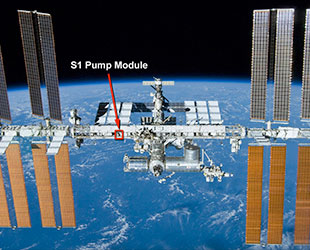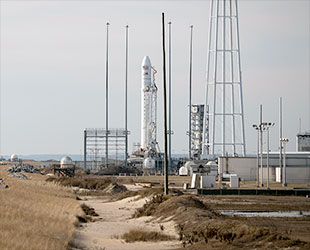December 17, 2013 — A commercial cargo flight to the International Space Station (ISS) has been postponed so astronauts on board the orbiting outpost can proceed with a series of spacewalks to repair a critical cooling system.
NASA on Tuesday (Dec. 17) announced that the launch of Orbital Sciences' Cygnus spacecraft would be delayed to January to give station crew members the time to replace a
pump module that stopped working properly on Dec. 11.
NASA is now planning for two Expedition 38 astronauts to venture outside the station on Dec. 21, 23 and, if needed, Christmas day, Dec 25. Flight engineers Rick Mastracchio and Mike Hopkins will remove the pump module that has a failed valve and replace it with one of three spares stored on the exterior of the station.
The pump module is associated with one of the station's two cooling loops, which circulate ammonia on the outside of the station to keep both internal and external equipment cool. When the flow control valve inside the pump module malfunctioned, the temperature of the ammonia in Loop A plummeted and it triggered the pump to shutdown.

NASA-labeled image showing the location of the pump module on one of the International Space Station's two cooling loops. A flow control valve in the module is malfunctioning, necessitating that it be replaced with a spare by two spacewalkers. (NASA) |
As a result, non-critical systems in three of the complex's modules were powered down, including experiments in the European Columbus and Japanese Kibo laboratories. The space station's more critical equipment was kept cool and running using the coolant system's Loop B.
In the days following the shutdown, with neither the crew nor the station itself in immediate danger, NASA followed concurrent plans, troubleshooting the faulty value while at the same time
having Orbital move forward with its launch preparations. Early Tuesday morning, Orbital rolled out its Antares rocket, topped with the Cygnus cargo spacecraft, to Pad 0A at the space agency's Wallops Flight Facility in Virginia.
Meanwhile, flight controllers made progress manipulating a radiator isolation valve in the faulty pump module to gain control regulating the temperatures in Loop A. Despite that work and the reintegration of a heat exchanger for the U.S. Destiny laboratory, NASA's mission managers decided the spacewalks were needed before Orbital could proceed with its
first contracted Cygnus flight to the station.
Orbital said Tuesday that the earliest its resupply mission could now launch would be Jan. 13. The company was set to roll back its Antares rocket to its processing hangar and offload time-critical payloads for safekeeping until the next attempt.

Orbital Sciences' Antares rocket, topped with a Cygnus resupply spacecraft, standing on Pad 0A at NASA's Wallops Flight Facility in Virginia on Tuesday morning, Dec. 17, 2013. (NASA/Bill Ingalls) |
Each of the three spacewalks will begin at 6:10 a.m. CST (1210 GMT) and is scheduled to last six and a half hours. Saturday's excursion will mark Mastracchio's seventh time on a spacewalk and Hopkins' first.
The 780-pound (355 kg) pump module that the astronauts will work to replace was previously swapped out in August 2010 after an earlier unit stopped working. A pump module replacement is among a short list of repairs that all space station astronauts are trained for before they launch.
